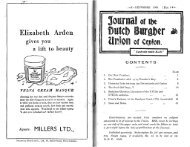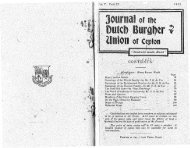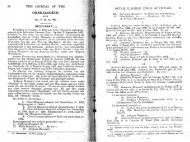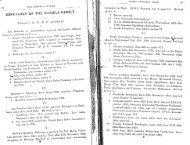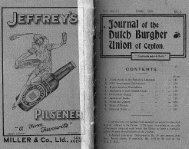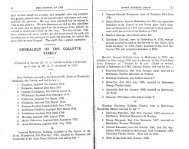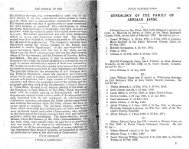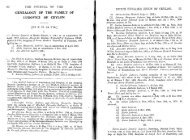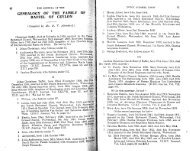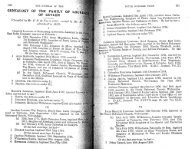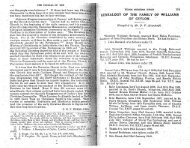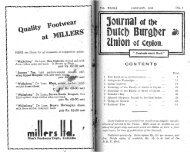Part 1-4 - Dutch Burgher Union of Ceylon
Part 1-4 - Dutch Burgher Union of Ceylon
Part 1-4 - Dutch Burgher Union of Ceylon
Create successful ePaper yourself
Turn your PDF publications into a flip-book with our unique Google optimized e-Paper software.
North by the <strong>Dutch</strong> Judges firmly refusing to take the oath <strong>of</strong> allegiance and<br />
accept judicial appointment under the British Crown. Special measures<br />
had to be taken to meet this situation. Later North was able to induce two<br />
<strong>Dutch</strong>men, Stephen Baron van Lynden and Gerald Joan Fybrands, to<br />
take the oath, and in 1801 they were made members <strong>of</strong> theCivil Raad. The<br />
taking <strong>of</strong> the oath involved a great sacrifice on their part, for in a letter to the<br />
Governor they explained that by taking this step they have created "many<br />
enemies amongst the principa 1 <strong>Dutch</strong> inhabitants." w The period <strong>of</strong><br />
transition from the procedure <strong>of</strong> the <strong>Dutch</strong> Courts to the new procedure<br />
had not run smoothly. It was not until the Charter <strong>of</strong> the 18th April, 1801,<br />
that a court <strong>of</strong> record called the Supreme Court <strong>of</strong> Judicature in the<br />
Island <strong>of</strong> <strong>Ceylon</strong> was established embracing a civil and criminal<br />
jurisdiction in Colombo and the surrounding District and over all<br />
Europeans resident in <strong>Ceylon</strong>. The Court was to consist <strong>of</strong> a Chief Justice<br />
and one Puisne Justice. The Charter also established a court <strong>of</strong> record<br />
styled the High Court <strong>of</strong> Appeal with jurisdiction to hear and determine<br />
appeals from any Courts <strong>of</strong> Justice in <strong>Ceylon</strong>, except the Supreme Court <strong>of</strong><br />
Judicature. The Judges <strong>of</strong> the High Court were the Governor, the Chief<br />
Justice, the Puisne Justice and the Secretary <strong>of</strong> State, or any two <strong>of</strong> them.<br />
This court had its own seal. There was to be an ultimate appeal to the King<br />
in Council. By the Proclamation <strong>of</strong> the 20th August, 1801, English was<br />
made the <strong>of</strong>ficial language <strong>of</strong> the Courts.<br />
The <strong>Burgher</strong>s soon realised that their only hope <strong>of</strong> advancement<br />
under the British was by a mastery <strong>of</strong> English. As <strong>Dutch</strong> is an Anglo-<br />
Germanic language sharing with English common roots, a common<br />
structure and to a large extent a common vocabulary the adjustment to<br />
English was not difficult. In 1839 J. G. Hillebrand was the first <strong>Burgher</strong> to<br />
be appointed a Supreme Court Judge. Earlier in 1835 Governor Sir Robert<br />
Wilmot Horton had nominated him as the first <strong>Burgher</strong> Member <strong>of</strong> the<br />
Legislative Council. Cecil Arnoldus Prins, King's Advocate Fiscal<br />
(English Attorney and Solicitor-General combined) was another <strong>Burgher</strong><br />
who received high <strong>of</strong>fice in the early years <strong>of</strong> British rule. 15)<br />
English education was one <strong>of</strong> the main channels <strong>of</strong> elite formation<br />
used by the <strong>Burgher</strong>s in the last century and the institution which was the<br />
seedbed <strong>of</strong> this elite formation was the Colombo Academy. Sir Robert<br />
Wilmot Horton founded the Colombo Academy (precursor <strong>of</strong> Royal<br />
College) at San Sebastian under the Principalship <strong>of</strong> Rev Joseph Marsh in<br />
1835 with twenty pupils. Rev Dr Barcr<strong>of</strong>t Boake succeeded Marsh and<br />
remained Principal <strong>of</strong> the Academy from 1842 to 1869. Under Boake's<br />
12<br />
regime the Academy became the principal educational establishment in the<br />
Island. The Academy produced a coterie <strong>of</strong> brilliant pupils who were later<br />
to distinguish themselves in the liberal pr<strong>of</strong>essions. In the 1840s the<br />
Academy was a kind <strong>of</strong> microcosm <strong>of</strong> the larger social world <strong>of</strong> <strong>Ceylon</strong> a<br />
decade or two later with Charles Ambrose Lorenz at the centre <strong>of</strong><br />
everything. Distinguished alumni associated with the early days <strong>of</strong> the<br />
Academy who were later to become well known in the legal pr<strong>of</strong>ession<br />
were R. F. Morgan, James Stewart#Charles Stewart, Frederick Nell, Louis<br />
Nell, C. A. Lorenz, John Boyle Siebel, John Eaton, C. L. Ferdinands and<br />
John Prins.<br />
Sir Richard Francis Morgan, born at Colombo on the 21st February<br />
1821, had a meteoric career. In 1840 he became a Proctor. In 1846 he was<br />
enrolled as an Advocate. In October 1851 he was appointed <strong>Burgher</strong><br />
Member <strong>of</strong> the Legislative Council. In 1856 he was appointed District<br />
Judge <strong>of</strong> Colombo. In December the same year he was appointed a Puisne<br />
Justice. Between 1861 and 1862 he acted as Queen's Advocate. In 1863 he<br />
was confirmed as Queen's Advocate, a post he held until 1874 when he was<br />
appointed Acting Chief Justice. He was knighted the same year. The<br />
Governor Sir William Gregory wrote to Sir Richard that he had a telegram<br />
from Lord Carnarvon empowering him to <strong>of</strong>fer Sir Richard the Chief<br />
Justiceship <strong>of</strong> the Colony. Sir Richard declined the <strong>of</strong>fer on the score <strong>of</strong> illhealth.<br />
(6) He reverted to his post as Queen's Advocate and he died at<br />
Colombo on the 27th January, 1876, at the age <strong>of</strong> fifty four. Sir Richard as<br />
Queen's Advocate initiated most <strong>of</strong> the important legislation in that era<br />
and also appeared for the State in several important cases.<br />
James Stewart, born on the 24th March, 1821, was appointed Deputy<br />
Queen's Advocate, a post he held until he died at the age <strong>of</strong> 30, on the 18th<br />
November, 1851. He was a keen lawyer and a brilliant speaker.



